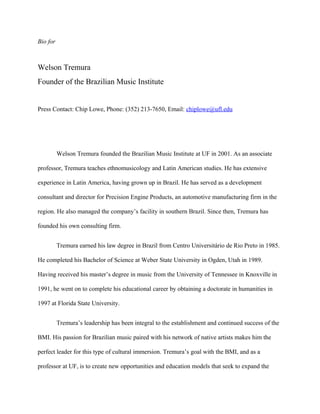BMI Sample - Event-Related Bio
- 1. Bio for Welson Tremura Founder of the Brazilian Music Institute Press Contact: Chip Lowe, Phone: (352) 213-7650, Email: chiplowe@ufl.edu Welson Tremura founded the Brazilian Music Institute at UF in 2001. As an associate professor, Tremura teaches ethnomusicology and Latin American studies. He has extensive experience in Latin America, having grown up in Brazil. He has served as a development consultant and director for Precision Engine Products, an automotive manufacturing firm in the region. He also managed the company’s facility in southern Brazil. Since then, Tremura has founded his own consulting firm. Tremura earned his law degree in Brazil from Centro Universitário de Rio Preto in 1985. He completed his Bachelor of Science at Weber State University in Ogden, Utah in 1989. Having received his master’s degree in music from the University of Tennessee in Knoxville in 1991, he went on to complete his educational career by obtaining a doctorate in humanities in 1997 at Florida State University. Tremura’s leadership has been integral to the establishment and continued success of the BMI. His passion for Brazilian music paired with his network of native artists makes him the perfect leader for this type of cultural immersion. Tremura’s goal with the BMI, and as a professor at UF, is to create new opportunities and education models that seek to expand the
- 2. school’s visibility nationally and internationally. By establishing collaborative relationships between academic and interdisciplinary projects, he has been able to achieve that standard and create an annual cultural experience. ###


